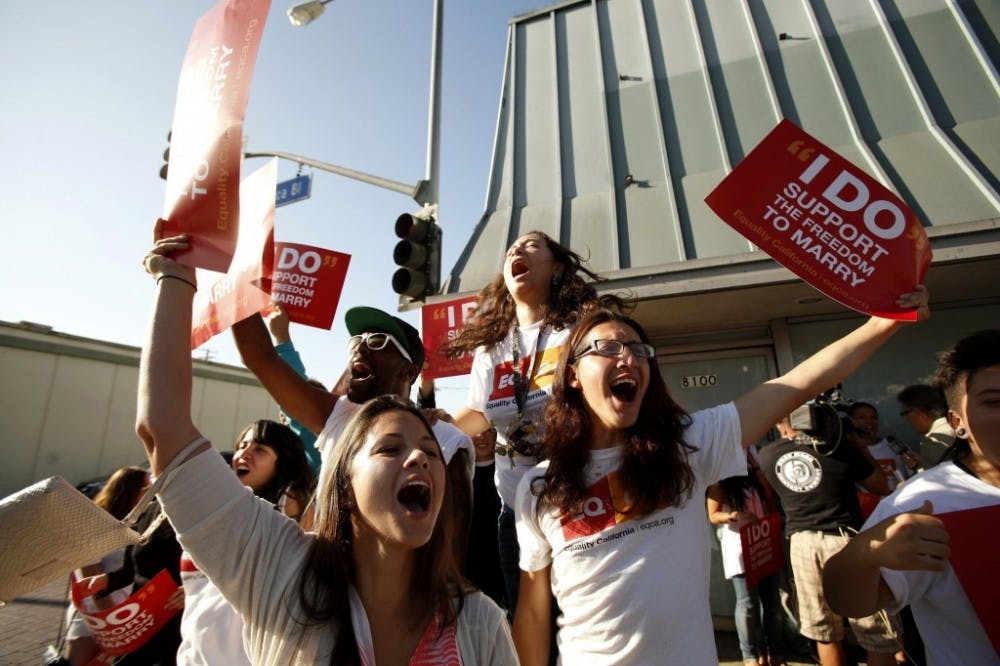In 2012, the state of North Carolina passed a constitutional amendment, known as Amendment One, which made it unconstitutional for the state to recognize or perform gay marriages or civil unions. After making its way through the North Carolina General Assembly, North Carolina voters approved the amendment, 61.04 percent to 38.96 percent, with 34.66 percent of registered voters turning out to vote. North Carolina is the last state to implement a voter-approved block to gay unions.
Gay marriage was already illegal in the state, but Amendment One took it a step further by defining marriage in North Carolina as being between one man and one woman — the state constitution now bans any other type of “domestic legal union” such as civil unions and domestic partnerships. The state continues not to recognize gay marriages performed in other states as well.
As attitudes toward gay marriage have continued to loosen around the country, Amendment One faced heavy condemnation across the state and nationally as well. Although Carolina voters ultimately voted the amendment into law, there was major concern at the time of voter perception regarding what the amendment would actually include.
Amendment One has once again appeared in the national spotlight two years later with the American Civil Liberties Union (ACLU) taking legal action against the ban on gay marriage in the state. Next month, judges from the 4th U.S. Circuit Court of Appeals, which covers Maryland, Virginia, West Virginia, and the Carolinas, will hear a case that could alter the legal landscape for gay marriage in North Carolina.
Nationally, 59 percent of Americans now support gay marriage, according to a new Washington Post-ABC News poll. That number represents an all time national high for support of gay marriage, with over half the country believing that gay men and women have a constitutional right to marry under the Equal Protection clause of the U.S. constitution. An Elon Poll in September showed that although acceptance of gay marriage is growing in the state, with 47 percent of state residents oppose it.
With this issue hitting so close to Elon, the coming months remain crucial in potentially overturning the voter-approved law from 2012. Some students have called on the Elon administration to issue some sort of statement or weigh in with a stance on this issue.
Ideally, the university would be transparent on a variety of issues— promoting statements in support or opposition to the slew of pressing topics in our state and for our generation. But the university does not owe us these opinions, and instead we, as students, must work to encourage meaningful action for the things that matter to us.
Students and faculty who feel strongly about this should call upon the amendment to be placed on the midterm ballot again for further consideration. If the 4th district court does not strike down Amendment one, it deserves to go back to the midterm ballot so as to better represent what the state actually wants.
It is time for North Carolina to examine this controversial issue from a human perspective and stop denying any human the right to be with the one they love, regardless of gender or preference.
Continuing to push agendas of inequality simply because its ‘the way it’s always been done’ has no place in an America that continues to develop to become more inclusive of all people.
As students, with vested interest in so many issues, we should take initiative to fight for the things that we believe in and not sit idly by paying lip service as a sign of support.
Symbolic gestures and shows of support are great, but they are not what will actually change the law.
More effort needs to be put towards actually getting Amendment One back on the ballot and then working to increase voter turnout.
We have the ability to make changes in the state that we currently call home. But those changes will only come if time and energy are put toward efforts that can result in tangible change—votes and new legislation.
North Carolina legislators must recognize the cries for equality within the state. Putting Amendment One back on the ballot gives voters the opportunity to come down on the right side of history.
Members of the Editorial Board are Nick Foley, Jonathan Black, Katy Canada, Alex Francis, Greg Honan and Lauren Phillips.


